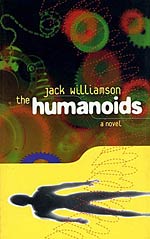
![]() BigEnk
BigEnk
1/4/2025
![]()
Despite their age, the two separate stories within The Humanoids hold up well. This fix-up collects two stories within the same universe, and some ending material from Williamson on his intended themes. This is a world in which a sleek robotic hive mind is designated with creed of: "To Serve and Obey, And Guard Men from Harm", which is then taken to its logical extremes. These robots take over world after world, preventing humans from doing anything that could make them 'unhappy or unsafe' to such an extreme that most humans end up extremely unhappy and unsafe from their own minds. Several human revolts attempt to shut them down, to varying degrees of success.
Williamson has a really strong and clear plot line that drives the stories forward decisively. It's a shame that in comparison he doesn't spend as much time getting his writing up to snuff. Sure, most of his prose is average, but there are low points that draw the rest of the material down with them. I have to remind myself though that this was written for the pulp magazines in the 40's, and in that context it's pretty readable and coherent. I enjoyed that the ending can be interpreted multiple ways: one in which Forester has a personal awakening and see that his hatred for the humanoids was delusional hatred, or was he brain-washed by the humanoids, the last individual wiped clean over a 50 years procedure. There's some neat exploration of personal liberty versus freedom in The Humanoids that I found interesting.
There's also a lot of focus put on the exploration of the, at the time, recent advancements in quantum mechanics. Williamson uses this scientific field as the basis for his explanation of teleportation and precognition, both of which are skills that apparently humans all hold the keys to, but are stymied by their own brains from achieving. It's interesting, but the actual technical writing trying to explain this coalescence of multiple science sub-fields into one grand design principle is both confusing and poorly written. Williamson needed to either spend more time fleshing out this explanation, or leave it more to the imagination. His fast-paced plot did not match with the drudgery of this explanation.
The Humanoids is right on the cusp between a book that I will end up hanging on to, and one that I will probably end up selling off for 50 cents of used book store credit. But I think ultimately it's a short and enjoyable read that's a good example of the genre during the earlier stages of it's popularity. The sick cover is a bonus too.